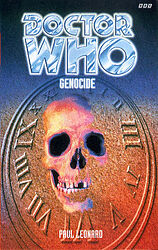
There are 4 reviews so far. To add a review of your own for this item, visit the voting page.
| By: | Jonny Jupiter, Hertfordshire, UK |
|
| Date: | Saturday 10 September 2005 |
|
| Rating: |    4 4 |
Absolute rubbish. Bland villans bland story bland ending. I was really looking forward to the inclusion of Jo Grant but in the end was left feeling we didnt really know what happened to her. There should have been far more interaction with the Doctor. Unless you are reading the 8th Doc's books in order steer well clear of this one
| By: | Piers, UK |
|
| Date: | Wednesday 26 July 2006 |
|
| Rating: |    7 7 |
This was the first Doctor Who book I'd read in a while, and it really reminded me of what I enjoy about these novels - an interesting story that is not just entertaining, but also makes you think about certain issues. Do we (the human race) deserve the Earth considering how we have treated it? Probably not. Considering the environmental issues that drive this novel, this could easily have been a Third Doctor adventure, which perhaps explains the presence of Jo and the very brief inclusion of UNIT.
Unfortunately these elements are the weakest part of the story: Jo is completely wasted. We learn a little about her current life, but beyond that this character could have been anybody. There was nothing about her that reminded me of Jo from the series, and her interaction with the Eighth Doctor is minimal. Most unforgivable is that there is no goodbye scene at the end; maybe Paul Leonard felt that he couldn't top Jo's leaving scene from 'The Green Death'. Also, a couple of loose ends aren't tied up: who did the anomalous fossilised skull belong to - Rowenna? Jacob?
In short a great story, as long as you don't dwell on a few niggling inconsistencies.
 |  |  |

 | If Only It'd All Been Ended |
|
 |  |  |
| By: | Martin Smith, England |
|
| Date: | Saturday 23 June 2007 |
|
| Rating: |    3 3 |
Genocide promises a lot really: big questions about wiping out entire races and also the reunion of Jo Grant with the Doctor. Shame it doesn't deliver.
The moral dilemma about whether The Doctor should go back and stop the eradication of humans and thus negating the Tractite civilisation is just woefully written. Sam's "decision" about it is, to be blunt, bloody stupid. It takes her two thirds of the novel to realise that if she were to stop the Doctor saving the humans, she was nullify her own existence (or at least that of her family and everybody she knows). I know she's only meant to be 17, but that's pretty bloody obvious. It would have made more sense for her to try and convince the Doctor to find a compromise between both civilisations rather than the titular genocide.
And then there's Jo Grant. Allegedly. She's barely recognisable as Jo and, crucially, barely interesting, only being worthwhile in her introduction as a divorced single mother. As soon as she gets involved in the action she becomes bland and expendable. Criminally, NOTHING is made of her reunion with the Doctor. Not a thing. You'd think that he'd at least ask some questions. Leonard doesn't even manage to create a believable relationship between Jo and Sam, even though they're stranded together for a while. Even if this sort of plot hadn't been done so well in School Reunion, it'd still be hugely disappointing.
This combined with pantomime villains, a flaccid and awkward attempt at the Doctor and Sam's relationship and slightly preachy ecological undertones creates one very underwhelming novel.
| By: | a person, hayfield |
|
| Date: | Friday 19 February 2010 |
|
| Rating: |    5 5 |
The EDAs had been going well until this. In my opinion I don't like paul leonards writing style. Its generally very depressing or confusing. The real problem is when he describes, say, a monster, you imagine it and then he say NO, and his description becomes entirely different. I find this terribly confusing. However, the plot is OK.


